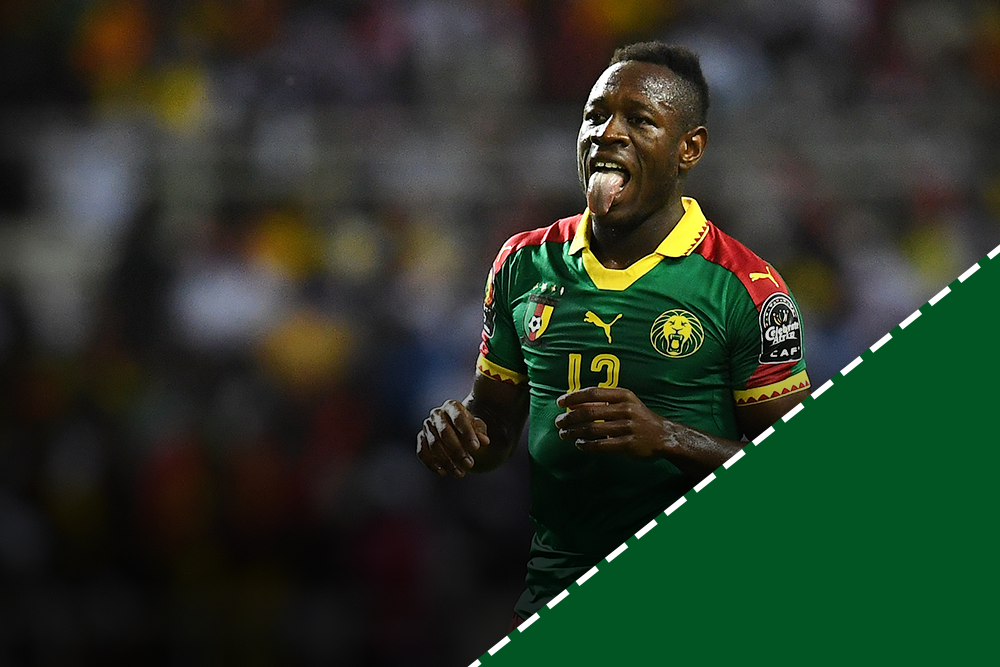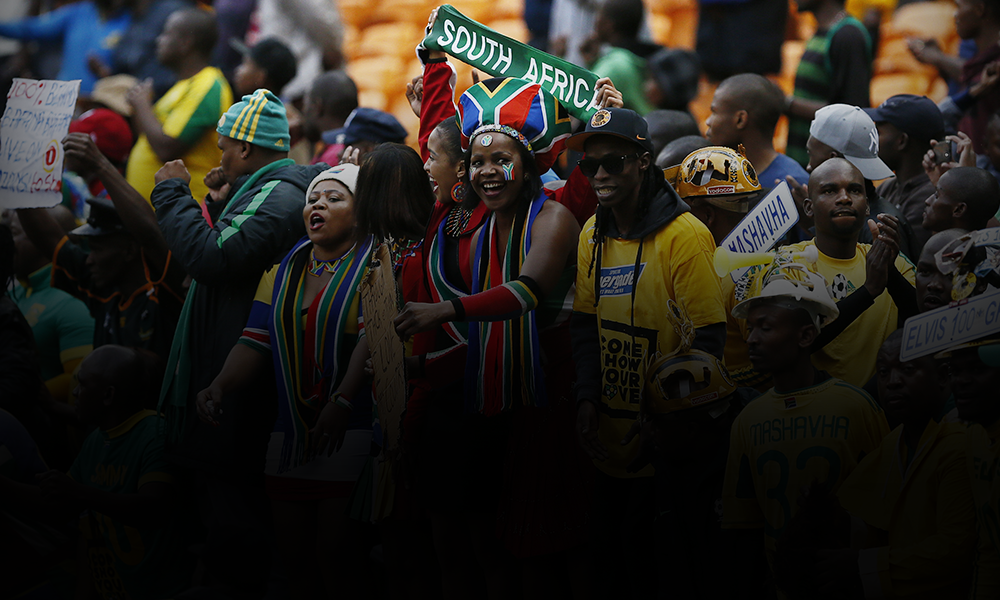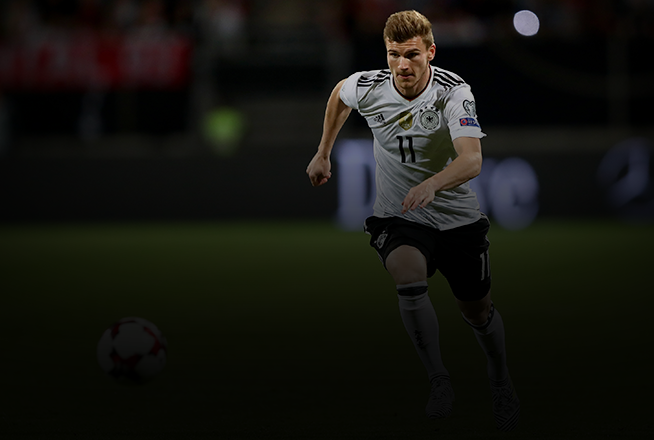
Eric Devin has compiled a list of the Top 5 Young Players to feature in the 2017 edition of the AFCON.
Tournament football is the definition of unpredictability, and this just-finished Africa Cup of Nations is a prime example of that. The highly regarded likes of Algeria and Cote d’Ivoire were dumped out of the tournament at the group stages, and Ghana were really the only side with “star power” to progress as far as the semifinals. Player performances were also somewhat unforeseeable as far as my own predictions were concerned; only three of these five players featured in a pre-tournament list. The other two, Bassogog and Kouakou, were admittedly unknown to me and their impressive displays were a welcome reminder of the value of a championship such as this one, with its diversity of leagues and styles represented.
Christian Bassogog // 21 // Cameroon // Aalborg
The Africa Cup of Nations always throws up an unheralded player or two, but this tournament was exceptional by any measure, with Bassogog the prime example. Normally a striker with his club side, Bassogog was used on the right of Cameroon’s 4-2-3-1 and the work rates of he and captain Benjamin Moukandjo were the keys to a dynamic attack, their pace and diligence stretching opposing defences almost at will. His finishing still needs some polish, and his best position is still a matter of some conjecture, but his first touch and willingness to sacrifice himself to the team’s tactical plan make him almost tailor-made for the Premier League, although he has already been linked with moves to Germany. He is still far from the finished article, and a tournament does not a player make, but given Aalborg’s middling season to date, he is certainly ready for a step up in competition.
Keita Baldé Diao // 21 // Senegal // Lazio
The only one of this group not to reach at least the semi-finals, Baldé Diao was unfortunate to miss out on further progression after Senegal’s elimination at the hands of Cameroon. His combination of physicality, pace and dribbling ability made him the ideal counterpoint to the smaller Sadio Mané on the opposite flank. Lazio have drifted from Champions’ League contention in Italy, and in his first chance to make an impression in an international tournament, Baldé seized his chance with both hands. Sure to have a crop of suitors come the summer, his following on a good start to the season with Lazio was impressive, even if Senegal weren’t especially so as a team.
Bertrand Traoré // 21 // Burkina Faso // Ajax (on loan from Chelsea)
Easily the best-known and most experienced of any young player in the tournament, Traoré’s inventiveness was key in the Burkinabés’ third-place finish. Nominally played as a right winger, his movement and reading of the game made him an ideal fulcrum for a team organized in a more defensive fashion. He scored just once in the tournament, but his movement and ability to draw fouls and hold possession was instrumental in his team’s assured performances. Also doing very well for Ajax, Traoré’s mature, disciplined displays won’t have gone unnoticed by Chelsea manager Antonio Conté; it will be very much a surprise if his loan odyssey continues beyond past this season.
Fabrice Ondoa // 21 // Cameroon // Sevilla B (on loan from Gimnastic de Tarragon)
One of two goalkeepers to be included on this list, Ondoa took the place of André Onana after the Ajax player declined a call-up from Hugo Broos. Despite his young age and lack of experience against top-flight European competition, Ondoa has been nothing short of magnificent. Like Baldé, Ondoa is a former Barcelona youth player, and his journey had recently found him playing for Sevilla’s reserves, despite being an important player for Cameroon since 2015. Not the biggest for a goalkeeper at six feet, Ondoa instead affects matches with his superb positioning and quick reflexes, his compact yet powerful frame making him a guardian in the mold of Vincent Enyeama.
Hervé Kouakou Koffi // 20 // Burkina Faso // ASEC Mimosas
Burkina Faso’s goalkeeping position lacked an heir apparent after the retirement of Abdoulaye Soulama, but Kouakou’s ascent to the role of starter was somewhat of a surprise. Veterans such as Germain Sanou and Daouda Diakité offered much more in terms of experience both with the national team and in their club football. The youngster was given the number one role in 2016 and has yet to relinquish it. Like Ondoa, he is a bit on the short side, but is adept at using his powerful body to control the area. His reflexes are good if not exceptional, and his impatience can get him into trouble at times, but at only 20, there is plenty of time to develop, especially if a move to Europe materializes in the future.
Honourable Mentions
This further quintet of young players all played fairly well, but don’t quite make the cut, as they were either less influential as regards their country’s success or their country failed to make the knockout stages.
Daniel Amartey // 22 // Ghana // Leicester City
Amartey was named in the official team of the tournament, so it may seem cruel to exclude him from this list, but the other five players are more firmly deserving of their place. Ghana were lacking cohesion for the most part, and scored only four goals all tournament. Perhaps this leaves an undue influence on the importance of a player operating in an unfamiliar role (center back) but his importance for his team simply wasn’t on the level of the five players selected ahead of him.
Denis Bouanga // 22 // Gabon // Tours (on loan from Lorient)
Uncapped before the tournament, Bouanga was comfortably the hosts’ best player. His blend of creativity and directness was impressive throughout, and with five goals and five assists in a defensively oriented Ligue 2 his season, there is more than a suggestion that he could earn a move away from his relegation-threatened parent club.
Chancel Mbemba // 22 // DR Congo // Newcastle United
Normally a center back for his club, where he has fallen out of favor this season, Mbemba plays for his country in defensive midfield, where he was outstanding, delivering a combative set of performances. An injury limited his effectiveness in the quarterfinal loss to Ghana, but his tournament suggests he might be deserving of a role in midfield for his club as well.
Farouk Miya // 19 // Uganda // Royal Excel Mouscron (on loan from Standard Liege)
Miya’s superb goal against Mali will catch the eye, but the youngster’s game is much more than that. Pacy and good with the ball at his feet, he also has a good range of passing and is effective applying pressure from the front. He probably needs more time at a higher standard than Belgium, but his energy makes him ideal for the modern pressing game.
Trézéguet // 22 // Egypt // Royal Excel Mouscron (on loan from Anderlecht)
Mohamed Salah had the flashier tournament of Egypt’s two wide men, but Trézéguet’s work pressing from the front and protecting the fullbacks was a big part of Egypt’s run to the final. He will need to show more end product to make the jump to the next level, given he isn’t exactly a raw prospect, but his maturity could allow him to make the leap should he choose to push for a higher level of football.





























































